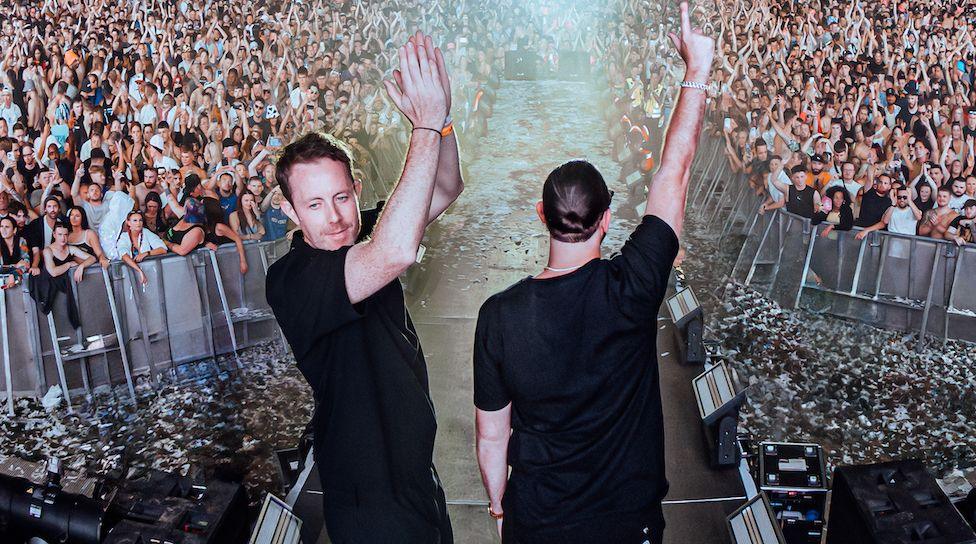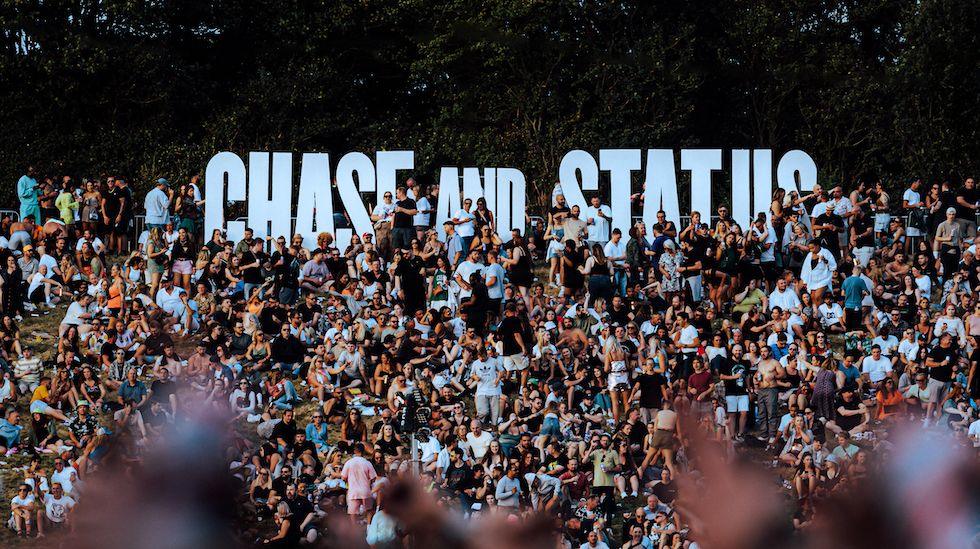Chase & Status get first number one with Backbone

Will Kennard (left) formed Chase & Status with Saul Milton (right) in 2003.
- Published
Chase & Status have achieved their first UK number one, more than 20 years after they first released music.
Backbone, which features Stormzy, sees the London pair return to drum and bass, with the genre currently experiencing a resurgence in the music charts.
Figures from the Official Charts company show dance and drum and bass consumption has increased nearly 13% in 2024 when compared to last year.
Will Kennard, who first released music as Chase & Status alongside Saul Milton in 2003, tells the BBC “you cannot replicate” the feeling of going clubbing.
But the success of their track comes at a time when fewer people are attending nightclubs, according to the Night Time Industries Association - yet dance music remains incredibly popular.

Chase & Status performed to 45,000 people earlier this month.
“I grew up going to small clubs and that’s where we fell in love with the music we make,” Kennard says.
“It’s a totally different thing doing a big concert to thousands of people with all the production to a small club experience".
He says that for dance music artists there’s a “dangerous trap” where they only make music to appeal to bigger crowds.
“Most artists come from an underground world and they gradually climb the ladder”, Kennard says.
“While you’re climbing the ladder you can forget where you came from, so we always try to check ourselves,” he adds.
The pair performed their biggest show to date last week, to a sold-out crowd of 45,000 people in Milton Keynes last Friday.
When asked whether people are choosing to attend big events like theirs, rather than going to their local club, Kennard says festivals and outdoor shows “might be more appealing".
The Night Time Industries Association has stated that 67 nightclubs closed in the UK in the first part of 2024, with 48 of them independent venues.
It means that approximately two clubs are closing every week in the UK.
'Cheese fests'

Charlotte Plank says people choose very carefully what club nights they spend money on
Fellow drum and bass artist Charlotte Plank, 23, says that what people look for on a night out has changed.
"You want to feel more like you're part of a community," she tells the BBC.
"I don't go clubbing much unless its a specific event or there's people I want to see," she adds.
The musician, who appeared on Rudimental's hit Dancing Is Healing earlier this year, says she associates some clubs with being "cheese fests" and that "pop-up or underground" events are something her and her friends seek out.
Can 24-hour drinking zones transform a city?
- Published5 August 2024
Night-time economy in alarming state - association
- Published23 April 2024
Cash-strapped clubbers make their nights out count
- Published10 February 2024
In February, the UK's biggest club chain owner Rekom announced it was closing 17 of its Pryzm and Atik venues - leading to 500 job cuts.
Cost of living has been cited as a factor and Plank also thinks that's to blame for less people going clubbing.
"People don't have much money for tickets - its a sign of the times," she says.
But other parts of the entertainment industry are booming - as Taylor Swift's Eras Tour closes its European leg in London this week, fans have snapped up thousands of tickets costing hundreds of pounds.
Major festivals across the UK like Glastonbury, Reading and Leeds are also sell-outs year on year too.
So it appears that those who want to listen to their favourite music may be being more selective about which dancefloor they choose to spend their money on.